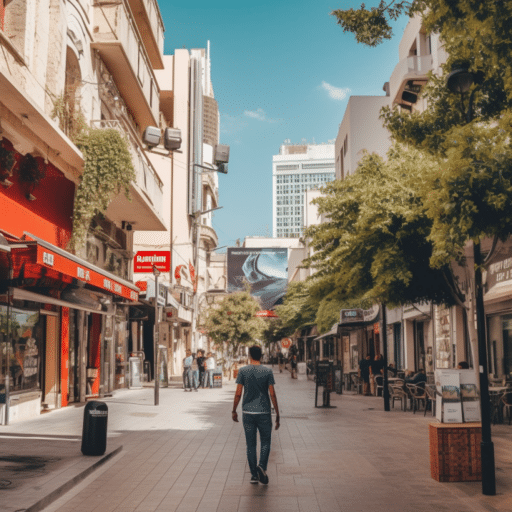Cyprus, a jewel in the Mediterranean, attracts many with its idyllic landscapes and rich history. But if you’re considering relocating or investing here, understanding the cost of living in Cyprus is crucial.
If you have any questions or want to invest as an expat or high-net-worth individual, you can email me (advice@adamfayed.com) or use these contact options.
Table of Contents
Housing and Accommodation
Housing decisions greatly influence the cost of living in Cyprus. Cyprus offers diverse living options, from bustling city centers to serene countryside locales. Your housing choices remain pivotal in determining how much you’ll spend in this Mediterranean paradise.
Renting in Cyprus
Renting remains a popular option for many, especially those not yet ready to buy property. The city and location can drastically influence the cost of living in Cyprus.
City-Center Apartments
Nicosia, the capital, and Limassol, a major port city, stand out regarding high rental prices. Being in the heart of business and culture comes with a price. City-center apartments, especially modern, well-maintained ones, can increase the cost of living in Cyprus. However, living in the city also means proximity to amenities, work, and entertainment, which can save on other costs.
Countryside Houses
If tranquility and space appeal, the countryside might be your calling. Even though the cost of living in Cyprus can be lower in rural areas, consider additional expenses like transportation. You’ll likely trade-off between the cost of rent and commuting prices. Plus, having a garden or a more extensive property might mean additional maintenance expenses.

Purchasing Property
Ownership has its benefits, but the initial investment can be steep. Recent market dynamics have shown fluctuations in property prices, and understanding these can help estimate the cost of living in Cyprus.
Trends in Property Prices
Over the past few years, the cost of living in Cyprus has experienced changes due to evolving property prices. Especially in tourist-favored locations like Paphos or Ayia Napa, prices have surged. This rise can be attributed to the growing demand from foreign investors and the allure of Cyprus’s golden visa program.
Regulatory and Economic Factors
The cost of living in Cyprus, particularly in terms of property prices, doesn’t exist in a vacuum. Local regulations, zoning laws, taxes, and the broader economy play a role. For instance, certain areas may have restrictions or benefits for foreign buyers.
Making an Informed Decision
Before taking the plunge and buying property, you must inform yourself. The cost of living in Cyprus can be manageable with careful planning. Consider working with local property advisors, familiarizing yourself with recent sales in your desired area, and always watching future developments that might influence property values.
Utilities and Monthly Bills
Your monthly bills, such as utilities and communication services, substantially shape the cost of living in Cyprus. To better understand these costs, we’ll break them down.
Electricity and Water
Every resident knows that the cost of living in Cyprus gets influenced heavily by the electricity and water bills, especially during certain seasons.
Seasonal Variations in Electricity Bills
Summers in Cyprus are notably hot and extended. As a result, many households and businesses ramp up their air conditioning usage, leading to higher electricity bills. Conversely, the mild winters might decrease heating usage but an uptick in water heating.
Water Consumption and Costs
While Cyprus is an island, freshwater can be a scarce resource. Efficient water use helps the environment and keeps monthly expenses in check. Regular maintenance of plumbing and being conscious of water use can make a noticeable difference in the cost of living in Cyprus.
Solar Power: A Sustainable Choice
Solar power is becoming increasingly popular among Cypriots. The ample sunlight the island receives provides an excellent opportunity for households to cut down on electricity costs. Adopting solar panels for heating water or generating electricity significantly reduces the overall cost of living in Cyprus.
Internet and Telecommunications
In today’s digital age, connectivity is vital, and the cost of living in Cyprus encompasses this need.
Broadband and Internet Packages
Cyprus boasts impressive high-speed internet capabilities. The infrastructure has consistently upgraded, and many service providers now offer fiber-optic connections. Residents can choose from a range of packages depending on usage—be it for streaming, gaming, or general browsing. While individual rates might vary, the overall cost of living related to internet services in Cyprus is in line with many European countries.
Mobile Connectivity and Plans
Mobile connectivity covers the entire island. The cost of living in Cyprus also depends on the mobile plan one opts for. Cyprus telecommunications providers cater to a wide audience, from unlimited data packages to pay-as-you-go options. Bundling mobile and internet services often leads to discounted rates, further helping manage Cyprus’s monthly cost of living.
Transportation Costs
Transportation remains a significant chunk of monthly expenditures for many, directly affecting the cost of living in Cyprus.
Public Transportation
Navigating the cities and towns of Cyprus is relatively easy, thanks to a reliable network of buses and trams. Especially in bustling urban regions like Nicosia or Limassol, these modes of transport are the go-to choices for many residents and tourists.
Bus System
The island’s bus system covers extensive ground. For daily commuters, availing of monthly or even yearly passes can be cost-effective, considerably trimming down the cost of living in Cyprus. The government also frequently subsidizes certain routes, making them even more affordable.
Trams and Other Modes
While buses dominate public transportation, trams are gaining popularity in some parts, offering a smooth and scenic ride. Always watch for promotions or deals that can provide additional savings, ensuring the cost of living in Cyprus remains manageable for those reliant on public transport.

Owning a Vehicle
Cyprus, with its breathtaking landscapes and picturesque villages, beckons exploration. Owning a vehicle can be your ticket to these mesmerizing sights. But, like every luxury, it comes with its set of costs.
Petrol Prices
Petrol prices in Cyprus, as of 2023, hover around the European average. While not excessive, frequent travelers should keep track of these when calculating Cyprus’s monthly cost of living. Some areas also offer electric charging stations, catering to the growing number of electric vehicles.
Maintenance and Insurance
Regular maintenance ensures your vehicle’s longevity and performance. While maintenance costs can be par for the course, insurance can vary. Though pricier, Comprehensive insurance policies can save substantial amounts in unforeseen circumstances, potentially reducing the long-term costs of living in Cyprus.
Other Vehicle-Related Costs
Apart from fuel and maintenance, residents should consider other costs such as parking, which in city centers can be premium-priced, and annual road taxes. These additional expenses, when overlooked, can surprise newcomers estimating the cost of living in Cyprus.
Food and Dining
When planning to live or vacation in Cyprus, one must account for the cost associated with food and dining as it plays a pivotal role in the overall cost of living in Cyprus.
Grocery Shopping
Buying fresh and local is a tradition deeply ingrained in the Cypriot culture. Local markets are the beating heart of this tradition, showcasing the island’s bountiful produce.
Local Markets vs. Supermarkets
Local markets offer not only fresher produce but also provide a genuine cultural experience. From fresh olives to local cheeses and seasonal fruits, these markets are a window into the Cypriot diet and lifestyle. Prices here often beat those in supermarkets, making them an excellent option for those looking to decrease the cost of living in Cyprus.
However, supermarkets offer convenience. With extended operating hours and a broader range of products, including international brands, many residents and expats find supermarkets fitting seamlessly into their busy schedules. This convenience might lead to a marginal increase in the cost of living in Cyprus, especially if one leans towards imported goods.
Seasonal Shopping
It’s worth noting that buying seasonal products further reduces the cost of living in Cyprus. Locally produced and seasonal items are fresher, more nutritious, and more affordable.
Dining Out
Cyprus’s culinary scene is as diverse as its history, drawing influences from Greece, Turkey, and the Middle East. This diversity reflects in the cost of living in Cyprus when dining out.
Street Food and Local Eateries
One must mention the affordable and delicious street food options to discuss the cost of living in Cyprus. From “souvlaki” (grilled meat skewers) to the traditional “koupepia” (stuffed vine leaves), Cypriot street food offers a taste explosion. Dining at local eateries, where a hearty meal can be enjoyed without breaking the bank, further demonstrates that the cost of living in Cyprus can be managed with smart choices.
High-End Restaurants and International Cuisine
For those seeking a more refined dining experience, Cyprus boasts an array of high-end restaurants. These establishments, often situated in tourist hubs or overlooking the azure Mediterranean waters, offer international and modern Cypriot dishes. Dining at these places can elevate your monthly expenses, influencing the cost of living in Cyprus for those who indulge frequently.
Drinks and Beverages
Local wines, spirits, and traditional drinks like “ouzo” are a treat for the palate and reasonably priced. While international beverages are available, opting for local choices can help manage the cost of living in Cyprus.

Healthcare
Navigating the world of healthcare is a primary concern when evaluating the cost of living in Cyprus. The island nation prides itself on offering public and private healthcare systems, catering to residents’ varying needs. Your healthcare choices can significantly influence the cost of living in Cyprus.
Public Healthcare
Cyprus shines with its strong public healthcare system, ensuring that citizens and permanent residents receive essential medical services. The government heavily subsidizes this sector, which, in turn, has a positive effect on the cost of living in Cyprus for many.
Accessibility and Benefits
The public healthcare system remains accessible to all legal residents. Once registered, you benefit from reduced consultations, treatments, and medication fees. This accessibility can ease the burden of the cost of living in Cyprus, especially for families and the elderly.
Potential Out-of-Pocket Expenses
While the public system offers many benefits, it’s essential to be aware of occasional out-of-pocket expenses. Some specialized treatments or medications might need to be fully covered. However, compared to many European countries, these costs still position the cost of living in Cyprus favorably.
Private Healthcare
When discussing the private healthcare sector, there’s no denying its impact on the cost of living in Cyprus. Many residents and expatriates lean towards private healthcare for various reasons, including shorter waiting times and specialized care options.
Advantages of Private Healthcare
One significant advantage of private healthcare is its broad clinic and specialized centers network. These establishments often have advanced equipment and a multilingual staff catering to the diverse population of Cyprus. For those who can afford it, this level of care can justify the added cost of living in Cyprus.
Cost Implications
Securing private healthcare insurance can undoubtedly raise the cost of living in Cyprus. Premiums vary based on coverage, age, and health conditions. It’s crucial to shop around, compare packages, and ensure you’re well-insured and underinsured. Proper research can help balance optimal healthcare and the cost of living in Cyprus.
Education and Childcare
The education and childcare landscape directly influences the cost of living in Cyprus, especially for families with children. Cyprus places a high emphasis on education, and parents have a range of choices from public to private institutions.
Public Education
Public education in Cyprus stands out with its comprehensive curriculum and dedication to academic excellence. Many families find that choosing the public route can make a notable difference in managing Cyprus’s overall cost of living.
Curriculum and Standards
Cyprus follows a rigorous national curriculum in its public schools. The Ministry of Education and Culture ensures that standards remain high, reflecting the country’s dedication to producing well-rounded citizens. Subjects like mathematics, science, languages, and the arts receive significant attention, preparing students for local and international tertiary institutions.
Costs Associated
One attractive feature that affects the cost of living in Cyprus is that public education is generally free at the primary and secondary levels. However, there might be minimal costs for materials, school trips, or after-school activities. These costs are usually manageable and won’t significantly raise the cost of living in Cyprus for most families.
Private Institutions
Private education is an alternative that many families consider. While the standards and facilities in private institutions are commendable, they invariably influence the cost of living in Cyprus.
Range of Options
Cyprus boasts several international schools, offering curricula like the International Baccalaureate (IB) and British GCSEs. These schools often cater to the expatriate community but have also gained popularity among locals. While they provide a global perspective on education, it’s essential to note that they play a role in increasing the cost of living in Cyprus.
Fees and Additional Costs
Tuition fees in private institutions vary widely based on the school’s reputation, curriculum, and facilities. On top of tuition, other costs, such as uniforms, books, and extracurricular activities, can add up. When budgeting for private education, families should consider these factors to get a realistic idea of the cost of living in Cyprus.
Scholarships and Financial Aid
Many private institutions offer scholarships or financial aid to counteract the potentially high costs. It’s beneficial for parents to research and apply for these opportunities as they can significantly reduce the cost of living in Cyprus when education expenses are factored in.
Leisure and Entertainment
Leisure activities undeniably shape our lifestyle choices and directly impact the cost of living in Cyprus. As an island known for its breathtaking landscapes and vibrant culture, Cyprus offers many options for residents and tourists.
Outdoor Activities
With its balmy Mediterranean climate and diverse terrain, Cyprus presents many outdoor activities that cater to all age groups and preferences.
Beach Activities
Famed for its pristine beaches, sunbathing or indulging in beach sports is a favored pastime. While lounging on the sand costs you nothing, renting sunbeds or umbrellas might. Moreover, engaging in water sports like jet-skiing, windsurfing, or scuba diving will undoubtedly increase the cost of living in Cyprus for those who indulge frequently.
Hiking and Nature Trails
The Troodos Mountains and Akamas Peninsula, among other spots, offer exhilarating hiking trails. Many trails are accessible without fee, but guided tours or park entries can add to the cost of living in Cyprus for nature enthusiasts.
Cycling Routes
Cyprus actively promotes cycling, with paths sprawling across its coastline and interiors. Renting a bicycle is affordable, but purchasing one and its maintenance will impact the cost of living in Cyprus, albeit marginally.
Cultural and Indoor Activities
Cyprus’s rich history and cultural fabric ensure plenty of indoor activities. These pursuits, while enriching, can influence the overall cost of living in Cyprus.
Cinemas and Theatres
The cost of living in Cyprus remains reasonable regarding cinema and theater outings. While ticket prices align with European standards, frequent visits, especially to premier shows or festivals, will add to monthly expenditures.
Museums and Historical Sites
The island boasts numerous museums, from the Cyprus Museum in Nicosia, showcasing archaeological finds, to thematic ones like the Wine Museum in Limassol. While many museums charge nominal entrance fees, discounts often apply for students, seniors, or group visits, thus moderating the cost of living in Cyprus for history buffs.
Nightlife and Clubs
Cyprus’s nightlife is vibrant, especially in cities like Ayia Napa, known for its clubbing scene. While local taverns and bars are reasonably priced, upscale clubs or events featuring international DJs can elevate the cost of living in Cyprus for party-goers. Cocktails, premium drinks, and entrance fees at exclusive venues also need to factor into one’s entertainment budget.
Pained by financial indecision? Want to invest with Adam?

Adam is an internationally recognised author on financial matters, with over 760.2 million answer views on Quora.com, a widely sold book on Amazon, and a contributor on Forbes.



